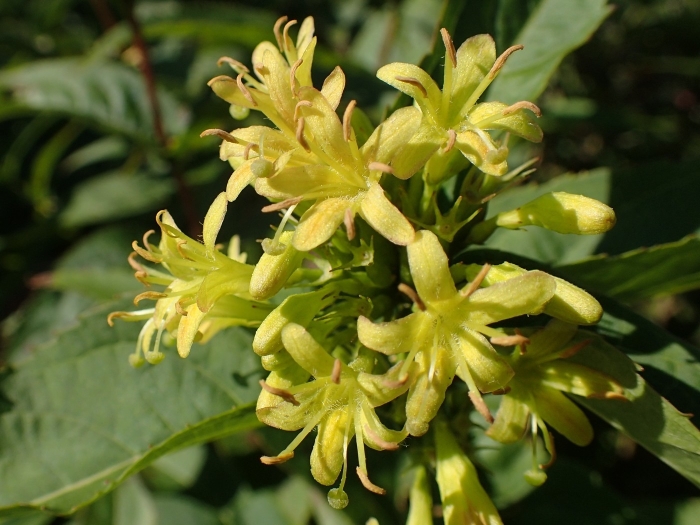Southern Bush Honeysuckle
(Diervilla sessilifolia)
Southern Bush Honeysuckle (Diervilla sessilifolia)
/
/

Evan M. Raskin
CC BY 4.0
Image By:
Evan M. Raskin
Recorded By:
Copyright:
CC BY 4.0
Copyright Notice:
Photo by: Evan M. Raskin | License Type: CC BY 4.0 | License URL: http://creativecommons.org/licenses/by/4.0/ | Rights Holder: Evan M. Raskin | Publisher: iNaturalist | Date Created: 2017-07-25T10:03:32-07:00 |




















































Estimated Native Range
Summary
Diervilla sessilifolia, commonly known as Southern Bush Honeysuckle, is a deciduous shrub native to the open woodlands, forest edges, and stream banks of the Southeastern United States. It is a compact, perennial shrub that typically grows three to five feet tall and equally wide. Southern Bush Honeysuckle spreads by suckering, creating dense colonies that can serve as effective erosion control. The plant features clusters of yellow, trumpet-shaped flowers that bloom in summer and are particularly attractive to pollinators. The foliage is a blue-green color that turns to a modest yellow in the fall.
Southern Bush Honeysuckle is valued for its adaptability to a range of soil conditions, its drought tolerance once established, and its ability to thrive in both full sun and partial shade. It is an excellent choice for naturalized areas, woodland gardens, and as a low-maintenance ground cover. It is hardy in USDA zones 4 to 8. While it is drought-tolerant, it benefits from medium amounts of water and well-drained soil. This shrub is relatively pest and disease-free, but can occasionally suffer from leaf spots or powdery mildew. It is not known to be invasive and does not have aggressive roots, making it a safe choice for gardeners looking to avoid these issues.CC BY-SA 4.0
Southern Bush Honeysuckle is valued for its adaptability to a range of soil conditions, its drought tolerance once established, and its ability to thrive in both full sun and partial shade. It is an excellent choice for naturalized areas, woodland gardens, and as a low-maintenance ground cover. It is hardy in USDA zones 4 to 8. While it is drought-tolerant, it benefits from medium amounts of water and well-drained soil. This shrub is relatively pest and disease-free, but can occasionally suffer from leaf spots or powdery mildew. It is not known to be invasive and does not have aggressive roots, making it a safe choice for gardeners looking to avoid these issues.CC BY-SA 4.0
Plant Description
- Plant Type: Shrub
- Height: 3-5 feet
- Width: 3-5 feet
- Growth Rate: Moderate
- Flower Color: Yellow
- Flowering Season: Summer
- Leaf Retention: Deciduous
Growth Requirements
- Sun: Full Sun, Part Shade
- Water: Medium
- Drainage: Medium
Common Uses
Bank Stabilization, Bee Garden, Bird Garden, Border Plant, Butterfly Garden, Deer Resistant, Drought Tolerant, Erosion Control, Fragrant, Groundcover, Hedges, Hummingbird Garden, Low Maintenance, Potted Plant, Rock Garden, Showy Flowers, Street Planting
Natural Habitat
Open woodlands, forest edges, and stream banks
Other Names
Common Names: Bush-Honeysuckle, Smooth Southern Bush-Honeysuckle, Stielloses Buschgeißblatt, Amerikaanse Weigelia, Kantgetris, 애기병꽃
Scientific Names: , Diervilla sessilifolia, Diervilla ×splendens, Diervilla sessilifolia var. sessilifolia, Weigela splendens,
GBIF Accepted Name: Diervilla sessilifolia Buckley